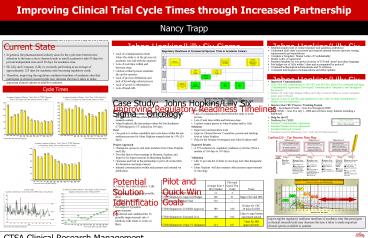Improving Clinical Trial Cycle Times through Increased Partnership - PowerPoint PPT Presentation
1 / 1
Title:
Improving Clinical Trial Cycle Times through Increased Partnership
Description:
... the time it takes to make important clinical options available to patients. ... Improve Clinical Review Committee process and tracking tools at Johns Hopkins ... – PowerPoint PPT presentation
Number of Views:44
Avg rating:3.0/5.0
Title: Improving Clinical Trial Cycle Times through Increased Partnership
1
Improving Clinical Trial Cycle Times through
Increased Partnership
Nancy Trapp Clinical Operations Team
Leader-Regulatory, Eli Lilly and Company
- Current State
- In general, the pharmaceutical industry aims for
the cycle time between site selection to the time
a site is deemed ready to enroll a patient to
take 90 days for private/independent sites and
120 days for academic sites. - Eli Lilly and Company (Lilly) is currently
performing at an average of approximately 125
days for academic sites becoming regulatory
ready. - Therefore, improving the regulatory readiness
timelines of academic sites that participate in
clinical research trials may decrease the time it
takes to make important clinical options
available to patients.
Johns Hopkins/Lilly Six Sigma Potential Root
Causes for Delayed Cycle Times
Johns Hopkins/Lilly Six Sigma Tips and Tricks
- Establish single point of contact (sponsor and
academic institution) - Understand each others processes and required
internal reviews (process, timing, requirements)
and expectations - Complete a Template / Master Letter of
Confidentiality - Master Letter of Agreement
- Standard template for non-protocol pieces of ICD
and usual procedure language - Site budget out of Lilly within 5 days and
accompanied by protocol - Continued technological advancements and IT
solutions - Consistent and frequent communications and status
updates
- Lack of communication about where the study is in
the process (at academic site and with the
sponsor) - Lots of wait time within and between steps
- Unclear contact person academic site and/or
sponsor - Lack of process definitions and lack of knowledge
about process - Lack of access to information
- Lots of hand-offs
Johns Hopkins/Lilly Six Sigma Improvements
- Improved Communication
- Lilly CRA will communicate to JH-CRO and JH-ORA
when PI is contacted and signs Confidentiality
Agreement Developed Communication Template to
use throughout the process - Partner JH with Lilly-Budget Office and
Lilly-Contract Office to resolve template issues
and overhead - Agreed on use of .pdf files and signatures in any
order on study amendments to Master Service
Agreement - Improve the CRC Process / Tracking System
- Lilly Investigator Portal Goes live
throughout 2008 - JH CRMS Goes live July 1, 2008 and will have
many features including a dashboard - Help for the PI
- Dashboard in CRMS
- Standard Confidentiality Agreement
- Standard Master Service Agreement
- Standard Informed Consent
- Standard costs for Pharmacy, SAC Lab, and
Professional fees
Cycle Times
Academic Institution Metrics Cycle Time of CTRB
Shipment Date to ICD Approval Date (median number
of days)
Academic Institution Metrics Cycle Time of Site
Selection Date to LOA Approval Date (median
number of days)
Sponsor Mike Amey, JH/Chris Davis, LLY Project
4279 Black Belt Kathy Ann Lawrence
Country USA
Case Study Johns Hopkins/Lilly Six Sigma
Oncology
Improving Regulatory Readiness Timelines
- Problem
- Multiple review boards and serial process steps
lead to lengthy site readiness activities when
partnering with academic research centers. - Johns Hopkins/Lilly has median values for Site
Readiness (CTRB shipped to CT ordered) at 169
days. - Goal
- Our goal is to reduce variability and cycle
times within the site readiness process for Johns
Hopkins research sites by 15 (24 days).
- Root Causes
- Lack of communication about where the study is in
the process - Lots of wait time within and between steps
- Unclear contact person at Johns Hopkins and/or
Lilly - Solutions
- Improved communication tools
- Improve Clinical Review Committee process and
tracking tools at Johns Hopkins - Help for the Primary Investigator and Johns
Hopkins staff
Green Quick WinGrey Improvement with
Simulation Black Future Benefit
Confirm120 The Process Flow Map
Data on file at Eli Lilly and Company
Data on file at Eli Lilly and Company
Academic Institution Metrics Cycle Time of CTRB
Shipment to Regulatory Ready Date (median number
of days)
- Project Approach
- Champions, sponsors, and team members from Johns
Hopkins and Lilly. - Two-day face-to-face meetings in Measure,
Analyze, and Improve Six Sigma sessions at
alternating facilities. - Openness and trust in the partnership to put it
all on the table for discussion and improvement. - Internal communication within each partner and
external via publication.
- Expected Results
- A 37 reduction in regulatory readiness cycle
time (from a median of 169 days to 107 days).
- Validation
- Lilly to provide list of trials in Oncology and
other therapeutic areas. - Johns Hopkins will also measure other sponsor
improvements in Oncology.
Pilot and Quick Win Goals
Potential Solution Identification
Data on file at Eli Lilly and Company
In 3 hours, the Johns Hopkins / Lilly team
Academic Institution Metrics Percentage of Sites
Declared Regulatory Ready by Date of Planned FPV
Control ChartAcademic Institutions Control Chart
of CTRB Ship to Reg Ready
- Brainstormed 69 different possible ideas
- Grouped the 69 ideas into 5 categories
- Developed 13 possible improvements
- Prioritized and combined the 13 possible
improvements into 4 solutions with teams to work
on them.
Improving the regulatory readiness timelines of
academic sites that participate in clinical
research trials may decrease the time it takes to
make important clinical options available to
patients.
Data on file at Eli Lilly and Company
Data on file at Eli Lilly and Company
CTSA Clinical Research Management Workshop































